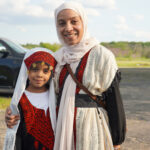Universally speaking, the words “strong women” somehow come across as a warning message for the masses and are viewed in a skeptical manner. As if a deliberate attempt is being made to undermine those in power by a unique force, i.e women. Unfortunately, whether it is in a Muslim or non-Muslim context, women around the world are sabotaged by fallacious ideas when it comes to seeking their rights. Some argue on the grounds of their supposed cultural and religious norms, whereas others on social, political, legal and economic basis.
With these views and biased perceptions accounting for a woman’s standing in society, it is crucial that we address this stereotypical notion of “strong women” in order to help steer clear of popular myths and beliefs. And, in order to break free of this thought cycle it is essential to understand and also make known to others (through our actions) what makes a woman strong.
What Makes a Woman Strong?
The following are just some personal reflective insights, which allude to a woman’s strength.
A strong woman is God-conscious.
A woman who recognizes that her existence and identity are a blessing from Allah is more likely to be confident as she chooses to use her strengths (in a positive way) to please Him and to be grateful to Him. Such a woman, will try to make use of opportunities that come her way, to grow. In the face of hardships and distress, she will seek Allah’s guidance and mercy and will rely on His will and support rather than solely trying to take things in her control.
A strong woman is self-aware.
Self-awareness comes from knowing one’s self well enough to realize their potential strengths, as well as limitations. A strong woman typically uses her strengths for the greater good and helps to uplift others around her. On the other hand, she is also respectful of her own boundaries and does not allow for overstepping. She acknowledges her vulnerabilities but does not see those as her weakness. Instead, she uses them as a means to seek comfort and solace by connecting with her creator.
A strong woman is courageous.
A strong woman chooses her battles wisely, and does not jump at every given opportunity to undermine her opponent or prove her stance. Instead, she chooses to remain humble and speak up only when it is necessary. She is strong-willed, meaning thereby that she is not explicitly vocal, stubborn, or strong-headed. Rather, she works her way by stepping out of her comfort zone to confront and address matters which deserve attention and, believes strongly in communicating effectively.
A strong woman is empathetic.
A strong woman is kind, caring, and trustworthy. She is not only brave and courageous but also has the heart to see and feel others’ pain. She understands the uniqueness of challenges in every individual’s life, hence, she does not shift the focus back on herself. Instead, she listens patiently and weighs her words before giving advice. An empathetic woman is certainly not ego-centric and believes in giving respect.
A strong woman is one who can take decisions.
A strong woman trusts her gut and judgment, and also strongly believes in learning through mistakes, which is why she does not blame others for her own failure or choices. She is confident in making decisions and even though she may not always be the one to implement them, she is able to reason her point of view based on rationale. In cases where mutual consent and decision making is involved, she professes her capability to negotiate for mutual interest and allows herself to be heard.
These outstanding characteristics are just a few that women could aspire to work toward in order to become a better version of themselves.
The Influential Role of a Mother
As per Islamic teachings, the role of a mother is pivotal to ensuring the successful upbringing of future generations. This is because the relationship between a mother and her child is the most treasured bond on earth, and serves as the foundation for all human life, that follows through.
“And We have enjoined upon man [care] for his parents. His mother carried him, [increasing her] in weakness upon weakness, and his weaning is in two years. Be grateful to Me and to your parents; to Me is the [final] destination.”
(Surah Luqman, 31:14)
Speaking of strong women, when a strong woman sets out to raise her children, she can have a powerful and positive influence on their lives, helping them to develop into confident, independent, and compassionate individuals. We see many such examples in Islamic history, some of which include Asiya and Moses, Maryam and Jesus, Fatima bint Asad and Ali Ibn Abi Talib, Asma bint Abu Bakr and Abdullah bin Zubair, and Umm Sulaym and Anas Ibn Malik, may Allah be pleased with them all. Their piety, wisdom, perseverance and devotion to Islam (among many other qualities) helped bring out the best in their children and also played a crucial role in shaping the early Islamic community, as a result.
Therefore, for Muslim mothers, it is paramount to the success of the Ummah, the larger Muslim community, to lean onto the teachings of Islam and reflect on the importance of adorning a strong character. Teaching our boys and girls about a woman’s strengths through a reflection of our own strong character, can prove to be highly advantageous in many ways. Let’s try and explore some of these areas, below.
1. Recognizing our innate qualities.
Teaching our children about a woman’s strengths can break down gender stereotypes and affirm the fact that both men and women possess a wide range of skills and abilities. And that Allah, in His infinite wisdom and mercy, created us this way. In this regard, it is important for mothers to help clarify the misconception between gender roles and gender equality.
Islam stresses a great deal on equality and women’s rights, but has differentiated the roles of both men and women, based on their physical and mental strengths and capabilities. This is why men are assigned financial responsibilities and women to nurture and care for the family. These broadly defined roles are, in fact, very different than just assuming that women should only do housework and men outdoor chores, or that women are weaker and men stronger. Each has certain rights over the other, and are expected to work together in a family as a team to achieve common goals.
2. Building empathy and respect.
The way a woman chooses to talk about other women or the way she treats other women in her life will impact how the children view women, in general. Therefore, it is important to model respectful behavior and encourage positive interactions with women. It is also significant to teach them about consent, as this can show them how to respect a woman’s boundaries. When a mother tries to be perfect at everything, from managing the house to raising her kids and loving her husband, she often loses herself in the process. And not only that, but she does not allow her family to understand that she, too, is a human who deserves attention, support and assistance (physically and emotionally). Resultantly, the children do not learn to value her efforts, nor those of their spouses into the future.
Understanding and appreciating a woman’s strengths can help boys and girls develop empathy and respect for women. This can lead to healthier relationships and interactions with each other throughout their lives.
3. Encouraging collaboration and teamwork.
Recognizing and valuing the strengths of others, regardless of gender, can help promote collaboration and teamwork. Boys who learn to appreciate women’s strengths are more likely to work well (and in a respectful manner) with female colleagues and partners and, happily share responsibilities.
Mothers can work towards reducing gender discrimination and bias, by involving them in age-appropriate household chores and giving them recognition for it. Children who grow up with a positive view of women and value their fair share of responsibilities are less likely to engage in behaviors that perpetuate discrimination and gender-based violence.
4. Nurturing patience and perseverance.
The women in Islam have often had to face difficult and challenging circumstances, but they have shown remarkable patience and perseverance in the face of adversity. Mothers can learn from those examples and cultivate a sense of resilience in their children, too, by showcasing their own strengths in this regard.
Teaching our children to remain steadfast in the face of difficulties, and continually turning to Allah for seeking His help and mercy are useful strategies, for a lifetime. Also, by teaching our sons and daughters about emotional regulation – helping them to identify and express their feelings – and encouraging them to find healthy outlets for stress and frustration can help nurture patience and perseverance from a younger age. By showing them that challenges can also be seen as opportunities for growth and learning, can help shift their perspective on acknowledging women’s strengths too.
5. Adorning modesty and humility.
Modesty and humility are also important values in Islam and it is important to help our children understand their significance in view of respecting others and even more so when it concerns the opposite gender.
It is an important aspect of Islamic teachings that encourages individuals to respect themselves and others by controlling their gaze and focusing on their own actions rather than the actions of others. The Prophet Muhammad, peace and blessings be upon him, said:
“Do not follow a casual (unintentional) look with another look. The first look is allowed for you but not the second.”
(Tirmidhi)
This applies not just to covering oneself or lowering the gaze, but also when it comes to concealing others’ flaws. Women usually like to gossip, whereas some men/women enjoy sharing sexist jokes as a means of humiliating the opposite gender. As role models for our children, we need to rise above these demeaning behaviors and encourage our children to do the same.
6. Providing examples of strong women in Islamic history.
Women are so privileged and honored in Islam that a whole chapter in the Holy Quran is dedicated to them (Surah An-Nisa, Chapter 4). There are additional instances where women have been highlighted in the Quran for their notable strengths, such as bravery, steadfastness, generosity, and patience.
Our children can be inspired to believe in the strengths of a woman by learning about the lives and achievements of these noble women from Islamic history. The important roles that these women played as scholars, leaders, and activists can also provide a reference point for emulating their qualities and adopting similar values. This can resultantly prove to have lasting benefits for the community at large in terms of tolerance, empathy, and justice.
Being a strong woman requires a great deal of effort and perseverance from our own selves, too. Because if we do not feel strong internally, that message will be communicated directly and indirectly to our children. Like our children, reminders can help us fall back in love with our strengths again.
By Umm Ahmed
Umm Ahmed is an early childhood educator and mother of three boys. Always on the quest to learn, she is passionate about seeking knowledge and passing it on to others. A writer in the making, she draws inspiration through deep conversations, laws of nature, and her own children. She and her family are currently living in Abu Dhabi, UAE














